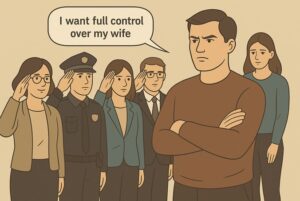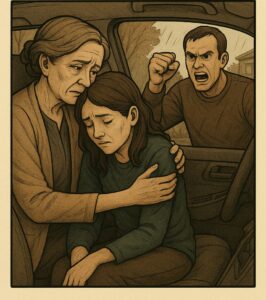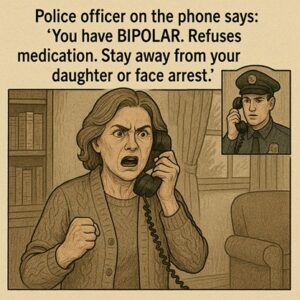“Once a diagnosis is declared incurable, it stops being medicine. It turns into a lifelong sentence and a weapon, used by insiders, supported by institutions, and accepted without question.” (Personal reflection)
It never seemed convincing to me that ‘bipolar disorder’ was an actual illness, although I had all the symptoms. It felt more like a response to life circumstances, personal choices, and inner conflicts. In the Soviet Union, there was no access to information or psychological help. I had never committed any crimes – only ‘suffered’ from creative ideas, emotional intensity, and nonstandard ways of thinking.
To America I came with hope for healing and a new beginning. I declared myself healthy. My relatives, trying to deport my daughter and me, reported me. An American official stated: “Lincoln had bipolar too. Welcome to America.”
For a moment, it felt like freedom had won.
I broke free from the relatives – worked, studied, helped others, created new things, raised my daughter. Over time, with the help of a psychologist I overcame the ‘disorder’, using psychological tools – through self-reflection, creative work, and deep inner analysis. I had overcome the illness a long time ago, but the stigma proved stronger than the diagnosis itself.
After my daughter’s marriage, a new ‘informed’ person entered the picture and this stigma became a powerful weapon for him.
Eventually, I had to leave America. Freedom had never truly been mine.
After the wedding my daughter’s husband began a process of destroying our communication – presented as ‘independence,’ but in reality, a way to gain full control. For several years, we stayed in interrupted contact, though it was increasingly tense. But by 2013, he imposed a total ban on communication between me, my daughter, and my grandchildren.

The decision was presented as my daughter’s own choice. When I asked to speak with her, he refused. Only after I threatened to call the police, she came, crying, “Talk to my husband.”
No one dared accompany me to their state to find out what was happening – people were afraid. Every organisation I contacted said the same thing: “She’s an adult. There’s nothing we can do.”
In 2015, I accidentally learned from a stranger that, under the influence of a therapist and the concept of ‘psychological separation,’ my daughter had officially renounced me as her mother. At that point, I decided to step back. I would offer an open, peaceful goodbye and move forward separately.
For that purpose, in December 2015, I traveled to see and talk to her and bring gifts for grandchildren for Christmas. Finally, I found a someone brave enough to accompany me. We parked outside. We didn’t enter the house.
My daughter was in a deep depression. She said she had “given me up as a mother” because I tried to shape her into a daughter convenient for myself – a separation doctrine.
But in the car she began to relax and speak more. My companion felt sorry seeing her in such a condition, and asked her some questions.
“Are you happy?”, “Do you want to continue living like this?”, “Do you see any alternatives?”
She gave the same resigned answers: “I don’t know.”, “There’s nothing to be done.”, “There is no way out.”
Then her husband Michael arrived. He ordered her to come home. She asked for thirty more minutes with us. He returned and she asked for ten more. Eventually, he came back angry, banging on the car window. The children were standing outside and their father tried to take the gifts away from them and shove them back in the car.

My companion tried to reason with him. “You’re a man. Leave them alone. Why interfere? Let them be, let them communicate.”
The husband was firm. “You don’t understand. She’s sick. She has bipolar disorder. She’s too emotional. I try to explain things calmly, but she won’t listen. Until she behaves properly, nothing will change.”
Hugging my daughter I whispered, “I’ll find a way.” I asked the grandchildren if they would like to visit me and they said they would. That was the last time I saw all of them
A year earlier, missing my grandchildren, I decided to meet them near the school bus stop. Still, I chose to tell my daughter. She handed the phone to her husband, and he said: “If you do that, I’ll call 911 and have you taken for a psychiatric evaluation.”
An evaluation for trying to see my grandchildren? It struck me as absurd. But he knew exactly what he was doing. In such stories, truth is irrelevant. What matters is whose version becomes official first. So, a day after our visit, when I got a call from the Pennsylvania (PA) police, I already knew whose version had won.
The way the policeman spoke to me was as if I was a criminal. He said if I ever attempted to contact my daughter again – directly or through someone else – I would be arrested for harassment.
But after the visit I was deeply worried about my daughter. As my phone number had been blocked, I had asked a friend to check on her.
I tried to understand what, exactly, I was being accused of. The officer stated that I had ‘bipolar disorder’ and was not taking medication. I replied that I had not had that diagnosis in many years, but he said: “That doesn’t matter.” The topic of medication had always been my son-in-law’s obsession and it was clear where this was coming from.

I contacted many legal organisations to find out on what legal grounds one could threaten arrest for an uninvited visit to one’s daughter. Not a single lawyer could give me a clear answer.
At that point, I turned to a PA attorney. At first, he seemed cooperative. He acknowledged what I already knew: that my daughter was completely dependent on her husband, who controlled even her smallest decisions. The lawyer was open to the idea of facilitating mediation. But everything changed after he spoke with the police.
He told me there was no protective order against me and no formal charges. Still, the police officer warned him that if I contacted my daughter again, even with a voicemail or a brief note, I could be charged with harassment. He shared no documents, just one vague phrase:
“Michael’s complaint is that you are causing problems when you are around his wife and he blames you for her behaviour that he does not like. Thus, you are controlling her – albeit indirectly – simply by being present.”
In that moment, it was clear what I was truly being accused of. Not of actions. Not of threats, harm, or any violation of law. I was being accused of existing. Of being a presence in my daughter’s life. That presence, in itself, was seen as ‘influence’ and therefore as something punishable. Michael saw it as a threat for himself. Yes, I knew that and it was true: I exist and I influence. That, apparently, was enough for the System to act. Kafka immediately came to mind.
The lawyer confirmed: there was no court order, no legal protection, no due process. The complaint, according to him, came formally from my daughter – her name appeared in the police files. But he also admitted that her husband was orchestrating everything from behind the scenes.
Despite this, the lawyer refused to speak with the husband or push for any face-to-face meeting. He left one message for my daughter, clearly understanding that she would not respond. His tone had shifted. His enthusiasm had turned to caution after his contact with the police. He offered two options.
Option one: file a Protection from Abuse (PFA) against the husband, but he admitted it would almost certainly fail without my daughter’s participation.
Option two: deliberately violate the unofficial no-contact rule. Send one message or make one call and if the police respond with a harassment charge, use the court hearing as a chance to see my daughter in person.
This was not advice. It was an invitation to self-sacrifice. A tactical trap dressed up as an option. And it got worse. The lawyer then proposed that I initiate a legal process, but only by signing a financially binding agreement. He knew the chances of success were minimal, and yet he encouraged me to commit financially in a situation where the outcome had already been pre-determined.
He wasn’t offering protection. He was managing my surrender – politely, professionally, and entirely within the logic of stigma. He didn’t question those who had built a wall around me. He didn’t request documentation. He didn’t demand medical evidence. He simply aligned himself with a system where a woman with a diagnosis automatically loses her voice. Where her emotions are suspect. Where her existence becomes a threat. This is how the legal system turns “protection” into a tool of control. This is how a lawyer becomes a quiet agent of social exclusion.
After an unsuccessful attempt to obtain legal assistance, I decided to contact the Pennsylvania police.
In the letter, I described how Michael had systematically isolated my daughter. After their marriage, in 2000 he had threatened to throw her out if I came to visit. In 2013, he enforced a total communication ban between me, my daughter, and my grandchildren. He read her messages, controlled her responses, and even enlisted a ‘friendly therapist’ to persuade her to cut all ties with me. That therapist was under state investigation. He showed cruel behaviour. Once, he even took her child away from my daughter, and she had to go to court to get the child back.
I acknowledged that I had been diagnosed with ‘bipolar disorder’ in the past, but explained that I had recovered by 2001 using psychological methods. I had not taken medication in many years and was stable. My therapist could confirm this. However, Michael used the outdated diagnosis as a permanent label to discredit me and depict me as a threat. I described how I had turned to lawyers and social service agencies, but all of them gave the same response: “She’s an adult. There’s nothing we can do.” I asked the police if they could offer any path forward: mediation, clarification, or even a way to ensure that my daughter was making decisions freely and not under pressure. I emphasised that I was not seeking confrontation. I was willing to appear in person and answer any questions. I only wanted to know: Was my daughter truly safe and free to make her own choices?
The following is a legal assessment of the email exchange between me and a Pennsylvania police detective. It highlights how informal authority was exercised without clear legal foundation, likely shaped by psychiatric stigma.
Denial of Legal Clarity
The mother repeatedly asked for the legal basis of the warning. The detective refused to cite any law, claiming only an attorney could explain it. Yet he issued a warning with implied criminal consequences, something that legally requires citation. The relevant statute (18 Pa. C.S. § 2709 – Harassment) was never named, depriving her of clarity.
- Ambiguous Threats
The police used phrases like “you have been warned” and “you could face prosecution,” but gave no legal definition of the warning, its duration, or scope. No official term like ‘No Contact Warning’ was used. This left the mother unsure whether any future action might provoke arrest. - Rejection of Peaceful Solutions
The mother proposed mediation or supervised contact. The detective dismissed these entirely, claiming no such legal options existed, and redirected her to private attorneys. This closed any route for resolution. - Unilateral Refusal Treated as Sufficient
The daughter’s refusal to engage was treated as self-justifying. The mother’s concerns were ignored, including written proof that the husband viewed her presence as influencing his wife’s mental state. The diagnosis cast on the mother was used to dismiss her perspective entirely. - Contradictions
While warning the mother not to contact her daughter, the officer also suggested she could write a letter. This contradiction created risk: following this advice might still be treated as harassment. The officer’s tone and reference to the mother’s psychiatric history revealed unconscious bias.
This correspondence functioned as a form of informal exclusion – no due process, no appeal — just stigma-based deterrence, cloaked in vague authority.
I turned to two different lawyers in hopes of understanding a situation where the law no longer seemed to offer protection, but instead they became an instrument of exclusion. One was in Pennsylvania, the other in New York. They differed in tone, involvement, and status. But both delivered the same message:
“You are at a dead end. Nothing can be done. The law is not on your side”.
This didn’t sound like legal advice – it felt like a systemic verdict. Neither of them could point to any legal basis that would allow me to reconnect with my daughter, challenge the stigma, or even simply explain myself. Both emphasised that even one letter could be interpreted as ‘control,’ that even speaking might be seen as a ‘threat’. Not because that’s the truth, but because that’s how perception works when a diagnosis is involved. But the way they conveyed this verdict differed.
The New York consultant was more sympathetic. He criticised the police, said the threats seemed like intimidation, and expressed personal empathy, even saying he himself felt like he had few rights in this country. But even he ultimately defaulted to a form of surrender. According to him, the law was vague, legal options were nearly nonexistent, and if I wanted to fight – it would cost a fortune.
He proposed creating a legal precedent and filing a case to draw attention, but named a huge price So he, too, ended not with help, but with monetising the dead end.
In the end, one lawyer was inside the system and quickly adapted to its rules. The other was outside the system, and thus free to criticise. But neither could offer protection. And both ended with a demand for money, without results, and without hope.
The Bottom Line:
This system doesn’t operate through law, but through interpretation. Through a diagnosis that cancels explanation. Through fear that replaces protection. And even lawyers, rather than challenging this, end up either stabilising it from within, or observing it powerlessly from the outside.
In this case, the husband used the police not to protect, but to isolate, cutting off his wife from her mother and establishing total control. The mother found no clarity, no due process, and no support – neither in private legal channels nor in official institutions.
The police failed to explain the legal basis of their warnings or to offer even minimal human engagement. Even if psychological abuse is difficult to assess, the fact remains: the mother’s voice was ignored. The tone of the communication suggested an unconscious bias shaped not just by her psychiatric history, but by broader stigma toward people with psychiatric diagnoses.
Following the incident, the mother left the country – not in defeat, but in protest. She continues to speak out and seek change.
At the heart of this story is a simple but vital principle:
Relationships between people should not be controlled by the police when no crime has been committed.
When law enforcement is used not to protect, but to silence or remove inconvenient relatives, it becomes a tool of intimidation rather than justice. In this case, the police not only cooperated in the exclusion – they also broke state law.
Conflicts in personal or family relationships that do not involve criminal behavior should be handled by neutral civil authorities, not by armed agents of the state. There is an urgent need for better systems to assess and respond to these situations fairly.
Suggestions:
1.Medical Recognition of Recovery
A psychiatric diagnosis should not be a lifelong sentence. The possibility of recovery must be acknowledged – medically, legally, socially, and culturally. This is the first step toward eliminating stigma and rejecting the outdated notion of the ‘incurably ill.’
- Justice Before Force
Independent centres are needed to hear both sides in family and personal conflicts -before police become involved. This would protect against punitive misuse of the system and offer a chance to restore justice in complex situations.
- Moral Dysfunction Should Be Treated
When someone deliberately uses a psychiatric diagnosis as a weapon to fulfil their own goals, it reveals a deeper moral dysfunction. Unlike many mental conditions, this dysfunction causes real harm to other people’s lives. It must be recognised, addressed, and treated no less seriously than so called psychiatric illness.
****
Mad in the UK hosts blogs by a diverse group of writers. The opinions expressed are the writers’ own.

wow, amazing story. i relate to this in many ways!